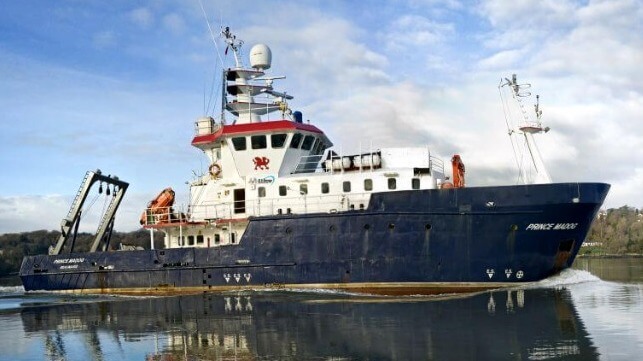UK Launches Largest Hydrogen Retrofit Using University Research Vessel

The largest retrofit of an existing vessel to hydrogen propulsion is getting underway in the UK. The Transship II project is receiving approximately $6.6 million from the UK’s Department of Transport in partnership with Innovate UK for the conversion of an existing research vessel with a hydrogen-electric hybrid propulsion system.
The UK’s only seagoing research ship within the higher education sector, the Prince Madog has been selected for the demonstration conversion project. At 390 gross tons and 114.5 feet in length, the vessel which was completed in 2001 is one of the largest ocean-going research vessels in Europe. She is co-owned by Bangor University in Wales and operated by OS Energy, based in Germany.
According to the university, the project is the largest refit of its kind to date. It is due to kick off in April 2023 and the project will last two years involving a partnership between the academic world and the maritime industry.
The Prince Madog was built by Scheswerf Visser BV, in the Netherlands entering service in July 2001. She is a multi-purpose research vessel used by the university to conduct marine research along the British coastline and in the Irish and Celtic Seas. She has accommodations for approximately 10 scientists including those training in the field and is operated by a crew of approximately eight.
Martin Nurenberg, Managing Director of OS Energy (UK) notes the project will “push the boundaries of traditional maritime propulsion systems.” As built, the vessel was powered by a Wärtsilä 20c diesel motor generating 1080 kW. She has a single, four-blade controllable pitch propeller giving her a speed of up to about 10 knots, and a single 150 kW thruster to aid with maneuverability.
The new hydrogen propulsion system, which will work in conjunction with a diesel-fueled main engine, will enable zero-emission operation at slow speeds or over short distances, such as the daily teaching trips with the students from the School of Ocean Sciences at Bangor University. In normal operation, the hybrid system and new novel propulsion design will reduce emissions by up to 60 percent.

that matters most
Get the latest maritime news delivered to your inbox daily.
“With an ambition to be leaders in this field, it is only fitting that our vessel is moving over to cutting-edge technology which significantly reduces emissions,” said Professor John Turner, head of Bangor University’s School of Ocean Sciences. “Reducing our carbon footprint by moving over to hydrogen power means Bangor University can continue to build upon our world-leading understanding of the environment and physical positioning of marine energy sites in a sustainable way.”
The project plans to demonstrate an approach that would exceed the IMO’s goal of a 40 percent reduction in emissions from the industry. The partners believe this project could help reshape the future of shipping. Once completed, the Prince Madog will receive hydrogen from the Holyhead Hydrogen Hub on Anglesey in North Wales.
